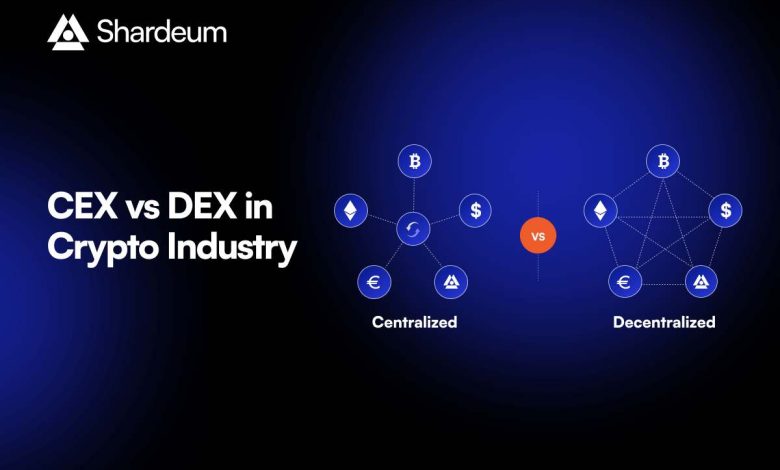A Comparison of Centralized vs Decentralized Exchanges

- Understanding Centralized Exchanges
- Exploring the World of Decentralized Exchanges
- Pros and Cons of Centralized Exchanges
- The Benefits of Decentralized Exchanges
- Security Measures in Centralized Exchanges
- Regulatory Challenges for Decentralized Exchanges
Understanding Centralized Exchanges
Centralized exchanges are platforms that are operated by a single entity or organization. These exchanges act as intermediaries between buyers and sellers, facilitating the trading of various cryptocurrencies. One of the main advantages of centralized exchanges is the high liquidity they offer, making it easier for users to buy and sell assets quickly. Additionally, centralized exchanges often provide advanced trading features such as margin trading and stop-loss orders.
However, centralized exchanges also have some drawbacks. One of the main concerns is the security risk associated with storing large amounts of cryptocurrency on these platforms. Centralized exchanges are vulnerable to hacking attacks, which can result in the loss of funds for users. Additionally, centralized exchanges require users to trust the platform to handle their assets securely, which goes against the ethos of decentralization that cryptocurrencies were built upon.
Despite these drawbacks, centralized exchanges remain popular among traders due to their ease of use and advanced trading features. Many users are willing to trade off some security and decentralization for the convenience and liquidity provided by centralized exchanges. It is essential for users to weigh the pros and cons of centralized exchanges carefully before deciding to use them for their cryptocurrency trading needs.
Exploring the World of Decentralized Exchanges
Decentralized exchanges (DEXs) have been gaining popularity in the cryptocurrency world due to their emphasis on security and privacy. Unlike centralized exchanges, DEXs do not rely on a third party to hold users’ funds, reducing the risk of hacking and theft.
One of the key advantages of decentralized exchanges is that they allow users to retain control of their private keys, giving them full ownership of their assets. This level of control is appealing to many in the crypto community who value autonomy and security.
Another benefit of DEXs is their ability to facilitate peer-to-peer trading without the need for a central authority. This means that transactions can be conducted directly between users, eliminating the need for intermediaries and reducing fees.
While decentralized exchanges offer many advantages, they also have some drawbacks. One of the main challenges facing DEXs is liquidity, as they often struggle to match the trading volume of centralized exchanges. This can result in slower transaction times and less favorable prices for users.
Despite these challenges, decentralized exchanges continue to grow in popularity as more users prioritize security and privacy in their trading activities. As the crypto industry evolves, DEXs are likely to play an increasingly important role in the ecosystem, offering a viable alternative to centralized exchanges for those seeking greater control over their assets.
Pros and Cons of Centralized Exchanges
Centralized exchanges have their own set of advantages and disadvantages that users should consider before deciding to trade on them. Here are some of the pros and cons of centralized exchanges:
- Pros:
- **Liquidity:** Centralized exchanges typically have higher liquidity compared to decentralized exchanges, making it easier for traders to buy and sell assets quickly.
- **User-Friendly:** Centralized exchanges are often more user-friendly and easier to navigate, especially for beginners in the cryptocurrency space.
- **Customer Support:** Centralized exchanges usually offer customer support services, allowing users to get help quickly in case of any issues.
- **Fiat Support:** Many centralized exchanges support fiat currencies, making it easier for users to deposit and withdraw funds.
- Cons:
- **Security Risks:** Centralized exchanges are more susceptible to hacking attacks and security breaches, putting users’ funds at risk.
- **Censorship:** Centralized exchanges can censor transactions and freeze accounts, leading to a lack of financial freedom for users.
- **Centralization:** Centralized exchanges are controlled by a single entity, which goes against the decentralized nature of cryptocurrencies.
- **Regulation:** Centralized exchanges are subject to government regulations, which can impact the privacy and anonymity of users.
The Benefits of Decentralized Exchanges
Decentralized exchanges offer several advantages over centralized exchanges that make them an attractive option for many cryptocurrency traders. One of the key benefits of decentralized exchanges is **security**. Since decentralized exchanges do not hold users’ funds, they are less vulnerable to hacking attacks and other security breaches that often plague centralized exchanges. This gives traders peace of mind knowing that their assets are safer on a decentralized platform.
Another advantage of decentralized exchanges is **privacy**. Centralized exchanges typically require users to go through a lengthy verification process that involves submitting personal information. On the other hand, decentralized exchanges allow users to trade without having to reveal their identity, providing a higher level of privacy for those who value anonymity.
Decentralized exchanges also offer **resilience**. Centralized exchanges are susceptible to downtime and outages, which can prevent users from accessing their funds or executing trades. Decentralized exchanges, on the other hand, are not controlled by a single entity, making them more resistant to disruptions and ensuring that users can continue to trade even in the face of technical issues.
Furthermore, decentralized exchanges promote **financial inclusion** by allowing users from all over the world to trade without being subject to the restrictions imposed by centralized authorities. This opens up opportunities for individuals in countries with limited access to traditional banking services to participate in the global economy and take control of their financial future.
In conclusion, decentralized exchanges offer a range of benefits that make them a compelling alternative to centralized exchanges. From enhanced security and privacy to increased resilience and financial inclusion, decentralized exchanges provide a more user-centric and empowering trading experience for cryptocurrency enthusiasts.
Security Measures in Centralized Exchanges
When it comes to security measures in centralized exchanges, there are several key factors to consider. Centralized exchanges typically have a higher level of security compared to decentralized exchanges due to the centralized nature of their operations. These exchanges often implement various security protocols to protect user funds and data from potential threats.
One common security measure in centralized exchanges is the implementation of two-factor authentication (2FA) for user accounts. This adds an extra layer of security by requiring users to provide a second form of verification, such as a code sent to their mobile device, in addition to their password. This helps prevent unauthorized access to accounts even if passwords are compromised.
Another important security measure is the use of cold storage for the majority of user funds. Cold storage involves storing funds offline in secure hardware wallets, making them less vulnerable to hacking attempts. By keeping the majority of funds offline, centralized exchanges can reduce the risk of large-scale thefts.
Centralized exchanges also often conduct regular security audits and penetration testing to identify and address potential vulnerabilities in their systems. These audits help ensure that the exchange’s security measures are up to date and effective in protecting user assets.
Overall, while centralized exchanges may face certain security risks due to their centralized nature, they have implemented various security measures to mitigate these risks and protect user funds. By following best practices in security protocols, centralized exchanges can provide a secure trading environment for their users.
Regulatory Challenges for Decentralized Exchanges
Decentralized exchanges face a myriad of regulatory challenges that can hinder their growth and adoption. One of the main issues is the lack of clear guidelines from regulatory bodies on how these platforms should operate within the confines of existing laws. This uncertainty can lead to legal risks for users and developers alike, as they may unknowingly violate regulations.
Another challenge is the difficulty in enforcing compliance with anti-money laundering (AML) and know your customer (KYC) regulations on decentralized exchanges. Unlike centralized exchanges, which have more control over user information and transactions, decentralized exchanges operate in a more anonymous and decentralized manner, making it harder to track and verify users’ identities.
Moreover, the cross-border nature of decentralized exchanges poses a challenge for regulators, as different countries may have conflicting regulations regarding cryptocurrencies and blockchain technology. This lack of harmonization can create legal uncertainties for decentralized exchanges operating in multiple jurisdictions, leading to potential legal disputes and regulatory crackdowns.
Overall, the regulatory challenges for decentralized exchanges highlight the need for clearer guidelines and regulations from authorities to ensure the legal compliance and long-term viability of these platforms. As the cryptocurrency industry continues to evolve, finding a balance between innovation and regulation will be crucial for the success of decentralized exchanges in the future.



